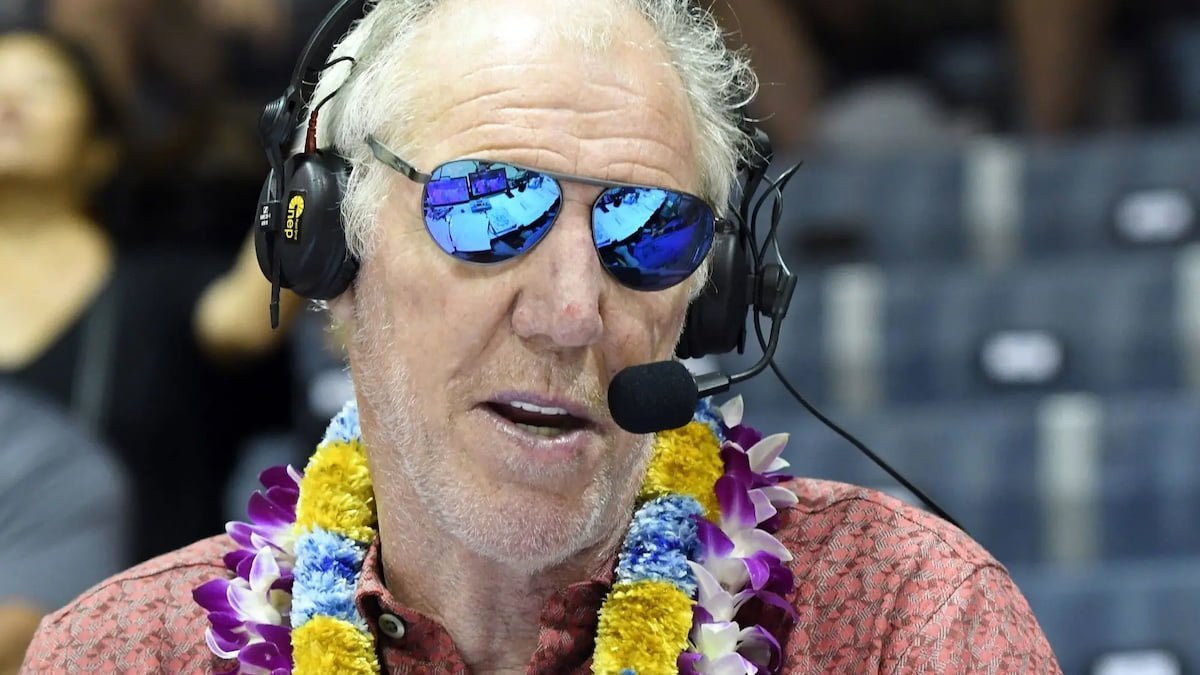The on-air career for Bill Walton was a powerful argument for authenticity, but almost nobody in broadcasting trusts that. They see Charles Barkley on Inside the NBA being utterly himself and people just loving it, but for some reason they think to themselves, Nah, I’ll adopt a persona.
This just in: Fake is boring.
Walton, who died Monday at age 71, was never fake, and he was rarely boring. On balance, he was himself. And in the end – and well before that – people appreciated him for it.
To be sure, the man could go on a tangent that might madden a hardened hoops watcher, the guy who lived for someone to tell him why a screen worked or how the leaping close-out on a three-point shooter rarely pays off. That definitely happened, and it happened a lot more over these past several years. I’ve watched plenty of Pac-12 basketball, put it that way.
Yet Walton will ultimately be remembered as simply and unapologetically individual. And if anything, his fame only increased over the past decade or so, even as he – how to put it? – cast his thematic net wider and wider during broadcasts.
It wasn’t always that way. In his earlier broadcasting days, like his time with the NBA on NBC, Walton toed the line fairly often, or at least as often as he could manage. It wasn’t really until later in his career that he became more broadly Bill, with all that implies.
He was open about everything – not just monologues on world affairs, historical notes and music updates, but also about himself. He was that rare public figure who didn’t mind being in public. He leaned into that. He pushed into crowds of people to talk, and he refused to be hurried on his way.
I only mention that characteristic of Walton’s here, on a site devoted to sports media, because it’s what enables us to know that the guy we heard on TV was authentic. We didn’t have to guess. Walton was publicly that same person; it was never an act.
I will say that off camera, Walton was often more gentle than you’d probably guess from hearing his oratory during games. His kindness was legendary, and one constant in his life was his steadfast encouragement of almost everyone around him. He was, in his own outsized way, a very humble person, and if you listened closely to the gamecasts you’d hear that come through.
He spoke in a staccato cadence on the air in part because it was the safest way for him to get a sentence out. Walton suffered with a debilitating stutter as a child and young adult, and he often said that finally overcoming it at age 28 was his life’s greatest achievement. A casual listener could easily mistake that on-air cadence for something forced, an act. It wasn’t.
Walton called things the way he saw them, and he loved hyperbole. He variously invoked Michelangelo, Mahatma Gandhi, Nelson Mandela and Martin Luther King Jr. in describing basketball players in recent years, sometimes two or three of them at once. (Take a bow, Nikola Jokic.)
That approach is certainly not for every viewer, but it is who Walton actually was. As a broadcaster, he was enthusiastically over the top – and well aware of it. He practically spoke with a wink, but he wasn’t faking. And his increasing renown through the last decade of his life underscores the truth that his authenticity, what made him him, resonated with far more viewers than it repelled.
But networks, and too often those in their employ, don’t particularly love individuals. They love carefully called games and, generally, analysts who color inside the lines.
With the NBA Finals about to start, Bill Walton’s passing feels like a good time to revisit the disastrous decision by ESPN/ABC to blow up one of the few memorably distinctive crews on the sports landscape. And when you zero in on why Mike Breen, Mark Jackson and Jeff Van Gundy worked so beautifully, it’s impossible to escape the obvious: Van Gundy sounds like himself.
The league most likely didn’t love that, because being yourself means saying what you actually think. Van Gundy is great at that. The NBA and its broadcast partners, maybe not so much.
I won’t argue that we need more Bill Waltons in broadcasting, because there was only one. We certainly need more people with Walton’s kindness and empathy in actual life. But writing strictly as a sports viewer, I would absolutely love for more broadcasters to step back inside their own skins – be who they are.
You won’t forget how to be an expert; you’ll just become a more human one. The world might even love it. It has happened before.

Mark Kreidler is a national award-winning writer whose work has appeared at ESPN, the New York Times, Washington Post, Time, Newsweek and dozens of other publications. He’s also a sports-talk veteran with stops in San Francisco and Sacramento, and the author of three books, including the bestselling “Four Days to Glory.” More of his writing can be found at https://markkreidler.substack.com. He is also reachable on Twitter @MarkKreidler.









